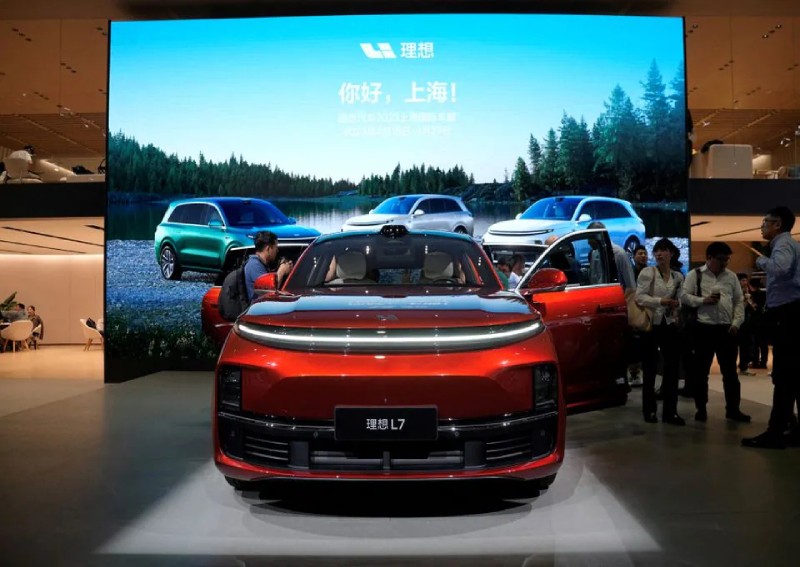Beyond BMW And Porsche: A Broader Look At The Challenges Facing Foreign Automakers In China

Table of Contents
The Chinese automotive market, the world's largest, presents both immense opportunity and significant hurdles for foreign automakers. While luxury brands like BMW and Porsche enjoy considerable success, a broader examination reveals a landscape fraught with unique challenges. This article delves into the multifaceted issues confronting international car companies attempting to thrive in this dynamic and competitive market. Understanding these complexities is crucial for any foreign automaker considering entry or expansion in China.
Intense Domestic Competition
The rise of domestic Chinese automakers represents a significant challenge for foreign brands. These companies are no longer simply competing on price; they are increasingly innovative and technologically advanced.
Rise of Domestic Brands
The rapid growth and technological advancements of Chinese automakers like BYD, NIO, and Xpeng are transforming the market. These companies are not just building cars; they're building ecosystems, leveraging technological advancements to create compelling products and services.
- Increasingly competitive pricing strategies from domestic brands: Chinese manufacturers are able to offer vehicles with comparable features at lower price points, directly impacting the market share of foreign automakers. This competitive pricing often includes government subsidies and incentives.
- Rapid innovation in electric vehicles (EVs) and autonomous driving technologies by Chinese manufacturers: Domestic brands are leading the charge in EV development and are rapidly integrating cutting-edge autonomous driving features, often exceeding the offerings of established international players.
- Strong government support and favorable policies for domestic auto brands: The Chinese government actively promotes the growth of domestic automakers through various incentives, including tax breaks, subsidies, and preferential access to resources.
Local Preference for Domestic Brands
Growing nationalistic sentiment and a preference for locally-produced vehicles are also factors influencing consumer choices. This is fueled by effective marketing campaigns and a perception shift regarding the quality and reliability of Chinese-made vehicles.
- Marketing campaigns emphasizing patriotism and national pride: Domestic brands effectively utilize marketing strategies that appeal to a sense of national pride and support for locally made goods.
- Consumer perception of quality and reliability of domestic brands improving: Significant improvements in manufacturing processes and quality control have led to a marked increase in consumer trust in domestic brands.
- Strong after-sales service networks established by Chinese brands: Extensive dealer networks and readily available parts provide a convenient and reliable after-sales experience for Chinese car owners.
Regulatory Hurdles and Bureaucracy
Navigating the complexities of the Chinese regulatory landscape presents a significant challenge for foreign automakers. Stringent regulations, bureaucratic processes, and concerns about intellectual property protection add significant costs and complexities to operations.
Navigating Complex Regulations
China's automotive market is subject to numerous regulations, including stringent emission standards, safety regulations, and import tariffs. These regulations often change, demanding constant adaptation and compliance.
- Time-consuming and costly certification processes for new vehicles: The process of obtaining the necessary certifications to sell vehicles in China is lengthy, complex, and expensive.
- Varying regulations across different provinces and municipalities: Regulations can differ substantially between different provinces and municipalities, adding to the complexity of compliance.
- Challenges in complying with data privacy and cybersecurity regulations: China has increasingly stringent regulations regarding data privacy and cybersecurity, which foreign automakers must navigate carefully.
Intellectual Property Protection Concerns
Protecting intellectual property rights remains a critical concern for foreign companies operating in China. The risk of technology theft and counterfeiting requires robust protection strategies.
- Risk of technology theft and counterfeiting: The unauthorized copying of designs, technologies, and intellectual property is a persistent threat.
- Difficulties in enforcing intellectual property rights through legal channels: Navigating the legal system to protect intellectual property rights can be challenging and time-consuming.
- Need for robust intellectual property protection strategies: Foreign companies need to implement proactive strategies to protect their intellectual property, including strong legal counsel and comprehensive security measures.
Understanding the Chinese Consumer
The Chinese automotive market is characterized by vast diversity in consumer preferences, ranging from budget-conscious buyers to luxury car enthusiasts. Successfully penetrating this market requires a deep understanding of these diverse segments and their evolving needs.
Diverse Consumer Preferences
Understanding the Chinese consumer means understanding their diverse needs and preferences, which vary significantly across regions and demographics.
- Understanding regional variations in consumer tastes and preferences: Consumer preferences can differ significantly between urban and rural areas, and between different regions of China.
- Adapting marketing and sales strategies to resonate with specific consumer segments: Tailoring marketing campaigns and sales approaches to appeal to specific consumer segments is essential for success.
- Meeting the rising demand for technologically advanced features and connected car services: Chinese consumers increasingly demand vehicles equipped with advanced technology features and connected car services.
Building Brand Loyalty
Establishing trust and building brand recognition is crucial in a highly competitive market. Foreign automakers must invest heavily in building relationships with Chinese consumers.
- Investing in robust marketing and public relations strategies: A comprehensive marketing and PR strategy is essential for building brand awareness and cultivating positive consumer sentiment.
- Providing exceptional customer service and after-sales support: Providing a high level of customer service and after-sales support is key to building loyalty and positive word-of-mouth referrals.
- Leveraging social media and digital platforms to engage with Chinese consumers: Effective utilization of social media and digital platforms is crucial for reaching and engaging with Chinese consumers.
Conclusion
The Chinese automotive market presents both massive potential and considerable challenges for foreign automakers. While established brands like BMW and Porsche have found success, navigating intense domestic competition, regulatory hurdles, and the nuances of the Chinese consumer is critical for long-term success. Foreign companies must adapt their strategies, invest heavily in research and development, and prioritize building strong relationships with local partners to effectively compete in this dynamic market. To thrive in the future, a thorough understanding of the unique challenges facing foreign automakers in China is paramount. Don't get left behind; start planning your strategy for success in the Chinese automotive market today.

Featured Posts
-
 Top Seed Pegula Claims Charleston Title After Battling Collins
Apr 27, 2025
Top Seed Pegula Claims Charleston Title After Battling Collins
Apr 27, 2025 -
 Patrick Schwarzenegger A White Lotus Cameo You Missed In Ariana Grandes Video
Apr 27, 2025
Patrick Schwarzenegger A White Lotus Cameo You Missed In Ariana Grandes Video
Apr 27, 2025 -
 Anti Vaccine Activist Review Of Autism Vaccine Link Sparks Outrage Nbc 5 Dallas Fort Worth
Apr 27, 2025
Anti Vaccine Activist Review Of Autism Vaccine Link Sparks Outrage Nbc 5 Dallas Fort Worth
Apr 27, 2025 -
 Austria And Singapore Wta Finals A Complete Match Summary
Apr 27, 2025
Austria And Singapore Wta Finals A Complete Match Summary
Apr 27, 2025 -
 Eqs Pvr Pne Ag Veroeffentlicht Gemaess 40 Abs 1 Wp Hg
Apr 27, 2025
Eqs Pvr Pne Ag Veroeffentlicht Gemaess 40 Abs 1 Wp Hg
Apr 27, 2025
